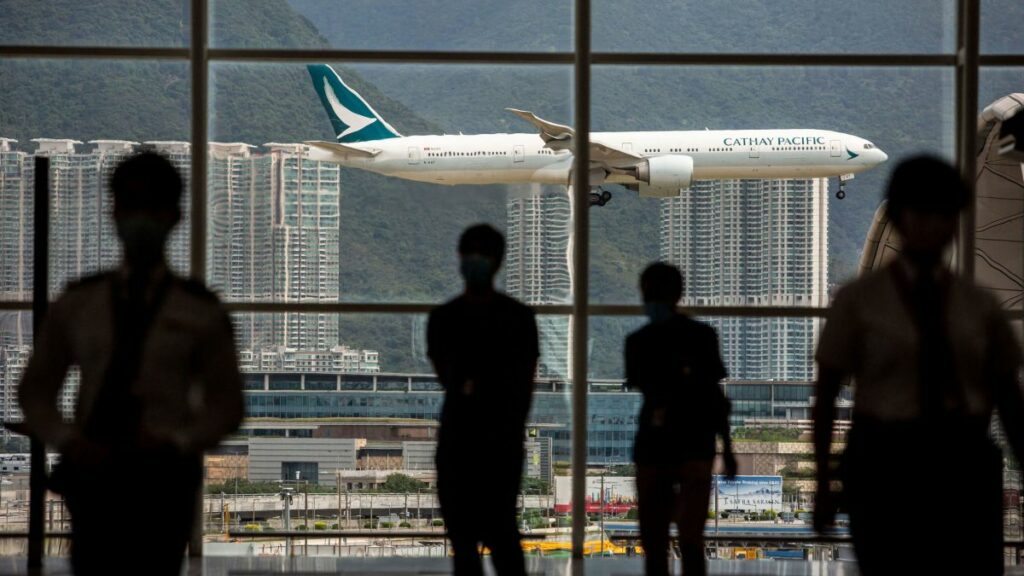In one of the world’s strictest quarantine regimes, pilots are reaching a breaking point

Two years on, pilots at flagship airline Cathay Pacific are so exhausted and depressed from working under one of the world’s “The morale is all gone. All gone,” said the first Cathay pilot, who has worked at the airline for several years. “Everybody’s angry.”Like most airlines, Cathay Pacific (“Up to the end of October our resignation and early retirement rate has been on par with historical data,” it said. To be sure, others in the aviation industry are feeling the pain in the Chinese city.In November, FedEx (The “closed loops” for such destinations are so grueling, according to the pilots, that Cathay has now set up emotional support groups for participants.”I know a lot of guys who pulled out of it. They just say, ‘We’re done doing closed loops,'” said the first pilot. “After one or two of them, they’re just like, ‘Yeah, I’m done. I can’t do this anymore.’ They just get tired of quarantine or isolation.”Pilots outside the “closed loop” program are losing patience, too. Another Cathay pilot, who has worked at the airline for more than a decade, said of the quarantine rules, “I think for me, one way to sort of describe it is: Imagine somebody came along once a day and just slapped you in the face.” “At the start, you’d just be like, ‘Oh, this is a bit annoying.’ And after a month, you would just be like, ‘Oh, this is starting to get a bit irritating now.’ And after 18 months or more, you’d just be like, ‘I’ve just had enough.'”Like staff at many airlines, all Cathay flight crew are fully vaccinated. And the carrier has said it is simply complying with government restrictions in Hong Kong, which still require most travelers to quarantine for up to three weeks, even if they are inoculated.Cathay has also been praised for sending its employees supplies during quarantine in some cases, such as refrigerators and air mattresses, as well as care packages. The airline told CNN Business that “we have done all we can to support our teams by managing what we can control, such as periods of free time after closed loop roster patterns, financial incentives and options to take extended leave of absence.” The company also noted a recent The second pilot said that his children were forced to change schools after the move, because he couldn’t afford the tuition fees anymore.He argued that Cathay could have made the pay cuts temporary, instead of permanent, saying that other airlines in similar positions had done more to protect their employees.”There’s got to be more you can do,” he said. “We’ve had permanent sweeping changes that will never be … the same again.”In its statement to CNN Business, Cathay said that the reorganization “was to protect as many jobs as possible, whilst meeting our responsibilities to the Hong Kong aviation hub and our customers.””Pilots were asked to consent to new conditions of service to better align incentives to productivity, and some 98.5% of the pilots did,” it noted. “These are competitive contracts, which enable us to continue to recruit and retain the very best people to be our pilots as we seek to survive and rebuild our business.”An industry shiftHong Kong authorities have defended their quarantine rules, pointing to the success the city has had in keeping out infection. The city of more than 7 million has recorded just over “We’re supporting crew who are currently isolating in Hong Kong,” a BA spokesperson said. “We have made the difficult decision to temporarily suspend flights to Hong Kong while we review operational requirements.”And the move by FedEx to shut down its crew base in Hong Kong has raised questions about the city’s role as a logistics hub. The decision was made “as there is no clear timeline when life may return to normal in Hong Kong,” Robin Sebasco, FedEx’s system chief pilot, wrote to employees in an internal memo, according to the South China Morning Post.CNN Business could not verify the memo, and FedEx declined to comment about that report. In its statement to CNN Business, the company stressed that it would “continue to maintain its operations in Hong Kong, which is vital to our Asia Pacific and global network.” Cathay, too, has said that it is “fully committed to protecting and enhancing Hong Kong’s aviation hub status … despite the challenging circumstances presented by the pandemic.”Some critics have already said that as travel restrictions continue, the former British colony is losing its luster as a global business center, though the government maintains such measures are needed to protect public health.Brendan Sobie, an independent aviation analyst and consultant, said there is also “concern” for the city’s future as an international aviation hub.”This is not just about the pilot or crew quarantine issues,” he told CNN Business, noting that “these issues have been happening virtually all year and will likely persist for some time given Hong Kong’s ‘Covid zero’ policy and the emergence of a new variant.” Sobie predicts that the Omicron variant will set back the recovery for aviation “throughout Asia and globally.””But the rival hubs are still in a much better position overall than Hong Kong,” he said, adding that “other international hubs in the region were starting to recover in recent weeks while Hong Kong was still stuck at minuscule traffic levels.””It could be very difficult for Hong Kong to compete from a hub perspective for some time, and there could potentially be permanent implications.”— Teele Rabane and Wayne Chang contributed to this report.


